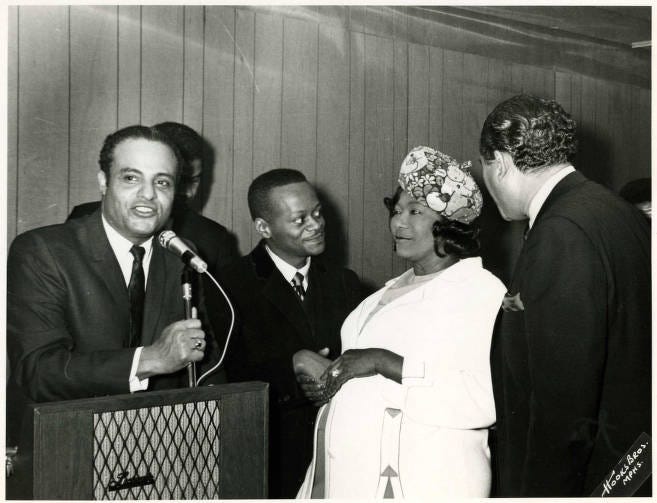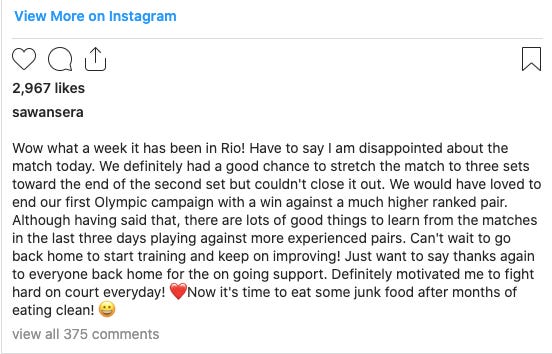Going for Gold
Or Do Athletes Eat Nuggets?
Hello Class,
After taking a brief summer vacation, I’ve returned from my break with even more excitement about my love of fast food and good teaching. My July was pretty quiet, except for some more good news for my book FRANCHISE: The Golden Arches in Black America, which was recently named the winner of the Benjamin L. Hooks Institute for Social Change National Book Award! The Institute, based at the University of Memphis, celebrates the legacy of hometown hero, Benjamin Hooks (1925-2010), a civil rights attorney and former head of the NAACP. Among his many accolades was his being named the first Black judge for the Shelby County Criminal Court and later held the distinction of being the first Black FCC commissioner. Fewer people realize that Hooks was the head of the short-lived Mahalia’s Glori-Fried Chicken franchise in the late 1960s. Check out this image of the official launch of the restaurant in 1968. Hooks is pictured at the podium.

I had the pleasure of talking to New Yorker editor David Remnick about FRANCHISE for the New Yorker Radio Hour podcast, Marissa Rothkopf’s books-and-baking podcast The Secret Life of Cookies, and Jacobin published this generous review of the book. Today rounded out with the airing of an interview I did with Jeffrey Brown from PBS Newshour about Black capitalism, fast food, and history.
And, it was a reunion of sorts this month, when I returned to Slate’s The Waves podcast to talk with. about the recently vacated conviction of Bill Cosby. The episode delved into the legal issues that led to the decision to overturn Cosby’s sentence for sexual assault, and the potential implications for #MeToo activism.
Despite decades of evidence that the Olympics are a bad idea all around and a global pandemic, the 2020-1 Olympics are upon us, and I’ve accepted that some of my favorite television shows will be pre-empted, and I will need to watch just enough coverage to maintain casual conversations with friends and family. At this point, I only read historian of sport Amira Rose Davis when I want to understand sports, and follow her on Twitter to catch up on her MULTIPLE podcast interviews and television appearances deconstructing the games (including the chatter around Simone Biles’s decision to withdraw from parts of the competition), as well as her articles about sports, race, and politics, including this illuminating set of interviews with Black women Olympians. It’s really good stuff.
But, you didn’t come here to hear why I think recreating an entire (very socially and economically expensive) society every few years, promoting quasi-nationalist feats of strength competitions, and encouraging gross public spending is terrible, you came here for the fast food. And, when you think of The Olympics, you often think about McDonald’s. Although McDonald’s ended its partnership with The Olympics in 2018, few companies have been so strongly associated with the Games than McDonald’s, from its direct sponsorship of the events to its commercials.
Few moments among the highlight and lowlight reels of the Golden Arches and the Olympics stand out like The 1984 U.S. Wins, You Win Fiasco. Perhaps one of the most appealing aspects of the Olympics, is that by virtue of your national identity, you can feel victorious about someone else’s achievement, while expending no energy at all. Maybe this is why I don’t like sports that much, it seems like a lot of people rejoice in the hard work of very few people. I don’t know if that makes me radically egalitarian or a big jerk, but anyway, the McDonald’s promotion of 1984 spread the Olympic love by offering free food to customers when members of Team USA won medals. How many medals could the U.S. actually win? Well, in 1984, the world soon found out after 14 countries boycotted the Los Angeles Games in solidarity with the Soviet Union, who accused the U.S. of anti-Soviet rhetoric prior to the games (also the U.S. boycotted the 1980 games—so an eye for an eye?) and an additional three declined to participate for other reasons, essentially reducing the number of overall participants. Lo and behold, Olympians from the United States were not only on home turf, but they also avoided competing against Olympic powerhouses from the Soviet Union and East Germany. What did that mean for fans of McDonald’s? LAist sums it up here:
Before the start of the 1984 Olympics, McDonald's struck up the idea of giving away free items for every medal that the U.S. won. How it worked was that a patron, upon purchasing an item at Mickey D's, would get a scratch-off card with an Olympic event on it. If the U.S. team won gold in that event, the patron would get a Big Mac. If the team won silver, the patron got french fries. Bronze meant a free soft drink. In certain respects, this was a genius idea because it gave us a tangible investment in the Games; Carl Lewis' success would be our success. We were participating from the seats of our own couch. The motto was "U.S. Wins, You Win."
With medal counts like these, it was no wonder that franchises ran out of Big Macs and counted down the days until the Olympic closing ceremony. Look at the top 10 medal earners of the 1980, 1984, and 1988 Olympics, and see for yourself why 1984 has gone down in the annals of Olympic promotion disasters.
1980
1984
1988
McDonald’s wasn’t deterred by the You Win promotion debacle, and continued to support the Olympics long after, but the giveaways were less costly and easier to plan for because they were not tied to individual performance. In the 1990s, regardless of the geopolitics of the Olympics, you could still be a winner, but this time, the Olympics collaboration featured the stars of the 1992 U.S. Men’s Basketball Team, also known as the Dream Team. You too could be a winner with these collectible cups, (if you bought a large drink).
McDonald’s last official Summer Olympics was in 2016. My favorite fast food news writer Kate Taylor answered the question: “Do Olympic athletes actually eat McDonald’s?” If you check out the photos from Rio’s Olympic Village or the Twitter accounts of post-competition Olympians, the answer is YES. So much so, the Olympic Village McDonald’s locations had to limit orders to TWENTY items per person, and Olympians turned to McDonald’s as their first junk food treat after months of following restrictive diets.
For those of you who are teaching summer school, the Olympics provide great impromptu conversation topics. From how cities pay for Olympics to how athletics engages in discourses on race and gender to the long history of Olympic controversies, the possibilities are endless. If you have found great ways to incorporate this current event in your teaching, share your idea with me at: chatelainoperations@gmail.com.
Continue to go for the gold folks!
Until next time,
Your Favorite Prof






